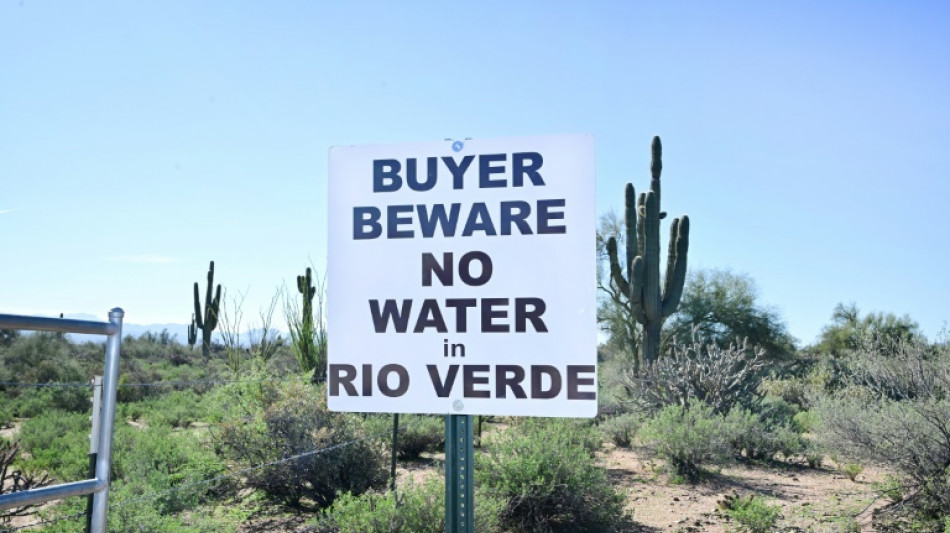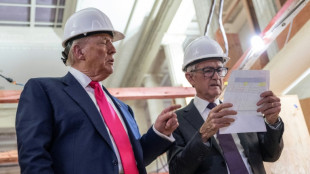
-
 Myanmar pro-military party claims Suu Kyi's seat in junta-run poll
Myanmar pro-military party claims Suu Kyi's seat in junta-run poll
-
Fed chair Powell says targeted by federal probe

-
 Trailblazing Milos Raonic retires from tennis
Trailblazing Milos Raonic retires from tennis
-
Australia recalls parliament early to pass hate speech, gun laws

-
 'One Battle After Another,' 'Hamnet' triumph at Golden Globes
'One Battle After Another,' 'Hamnet' triumph at Golden Globes
-
Japan aims to dig deep-sea rare earths to reduce China dependence

-
 Top UN court to hear Rohingya genocide case against Myanmar
Top UN court to hear Rohingya genocide case against Myanmar
-
US sends more agents to Minneapolis despite furor over woman's killing

-
 Trump says Iran 'want to negotiate' after reports of hundreds killed in protests
Trump says Iran 'want to negotiate' after reports of hundreds killed in protests
-
Bangladesh's powerful Islamists prepare for elections

-
 NBA-best Thunder beat the Heat as T-Wolves edge Spurs
NBA-best Thunder beat the Heat as T-Wolves edge Spurs
-
Ukraine's Kostyuk defends 'conscious choice' to speak out about war

-
 Trump says working well with Venezuela's new leaders, open to meeting
Trump says working well with Venezuela's new leaders, open to meeting
-
Asian equities edge up, dollar slides as US Fed Reserve subpoenaed

-
 Hong Kong court hears sentencing arguments for Jimmy Lai
Hong Kong court hears sentencing arguments for Jimmy Lai
-
Powell says Federal Reserve subpoenaed by US Justice Department

-
 Chalamet, 'One Battle' among winners at Golden Globes
Chalamet, 'One Battle' among winners at Golden Globes
-
Turning point? Canada's tumultuous relationship with China

-
 Eagles stunned by depleted 49ers, Allen leads Bills fightback
Eagles stunned by depleted 49ers, Allen leads Bills fightback
-
Globes red carpet: chic black, naked dresses and a bit of politics

-
 Maduro's fall raises Venezuelans' hopes for economic bounty
Maduro's fall raises Venezuelans' hopes for economic bounty
-
Golden Globes kick off with 'One Battle' among favorites

-
 Australian Open 'underdog' Medvedev says he will be hard to beat
Australian Open 'underdog' Medvedev says he will be hard to beat
-
In-form Bencic back in top 10 for first time since having baby

-
 Swiatek insists 'everything is fine' after back-to-back defeats
Swiatek insists 'everything is fine' after back-to-back defeats
-
Wildfires spread to 15,000 hectares in Argentine Patagonia

-
 Napoli stay in touch with leaders Inter thanks to talisman McTominay
Napoli stay in touch with leaders Inter thanks to talisman McTominay
-
Meta urges Australia to change teen social media ban

-
 Venezuelans await political prisoners' release after government vow
Venezuelans await political prisoners' release after government vow
-
Lens continue winning streak, Endrick opens Lyon account in French Cup

-
 McTominay double gives Napoli precious point at Serie A leaders Inter
McTominay double gives Napoli precious point at Serie A leaders Inter
-
Trump admin sends more agents to Minneapolis despite furor over woman's killing

-
 Allen magic leads Bills past Jaguars in playoff thriller
Allen magic leads Bills past Jaguars in playoff thriller
-
Barca edge Real Madrid in thrilling Spanish Super Cup final

-
 Malinin spearheads US Olympic figure skating challenge
Malinin spearheads US Olympic figure skating challenge
-
Malinin spearheads US figure Olympic figure skating challenge

-
 Iran rights group warns of 'mass killing', govt calls counter-protests
Iran rights group warns of 'mass killing', govt calls counter-protests
-
'Fragile' Man Utd hit new low with FA Cup exit

-
 Iran rights group warns of 'mass killing' of protesters
Iran rights group warns of 'mass killing' of protesters
-
Demonstrators in London, Paris, Istanbul back Iran protests

-
 Olise sparkles as Bayern fire eight past Wolfsburg
Olise sparkles as Bayern fire eight past Wolfsburg
-
Man Utd knocked out of FA Cup by Brighton, Martinelli hits hat-trick for Arsenal

-
 Troubled Man Utd crash out of FA Cup against Brighton
Troubled Man Utd crash out of FA Cup against Brighton
-
Danish PM says Greenland showdown at 'decisive moment' after new Trump threats

-
 AC Milan snatch late draw at Fiorentina as title rivals Inter face Napoli
AC Milan snatch late draw at Fiorentina as title rivals Inter face Napoli
-
Venezuelans demand political prisoners' release, Maduro 'doing well'

-
 'Avatar: Fire and Ashe' leads in N.America for fourth week
'Avatar: Fire and Ashe' leads in N.America for fourth week
-
Bordeaux-Begles rout Northampton in Champions Cup final rematch

-
 NHL players will compete at Olympics, says international ice hockey chief
NHL players will compete at Olympics, says international ice hockey chief
-
Kohli surpasses Sangakkara as second-highest scorer in international cricket


Paper plates and short showers: life with no water in Arizona
With its cactus-filled garden and breathtaking views of the rocky peaks of the Arizona desert, Wendy and Vance Walker's home in the Rio Verde Foothills seemed to be a little slice of paradise.
Until the water was cut off.
The neighboring city of Scottsdale decided it could no longer afford to sell its dwindling supply from the Colorado River, as a decades-long drought bites the American West.
For three months, the couple have eaten from disposable paper plates, had lightning-quick showers only every few days and collected rainwater to flush their toilets.
"A lot of people don't take the drought seriously," said Wendy, as she stood in the kitchen of their $600,000 home.
"And we, even though we live in the desert, we really didn't take it seriously either.
"Until you have to."
- Tankers -
Homes in fast-growing Rio Verde Foothills have never had running water -- there are no mains pipes -- so the 500 households without access to their own wells bought tankerloads from Scottsdale.
Most of that city's supply comes from the Colorado River, a mighty watercourse that rises in the Rocky Mountains and winds 1,450 miles (2,300 kilometers) through seven US states and Mexico, providing a lifeline for 40 million people.
But what was one of the world's great rivers has now shrunk.
Human-caused climate change means the once-bountiful snowpack that feeds the river has dwindled.
What snow there is melts more quickly because of higher temperatures, and more is lost to evaporation.
What does become river water is subject to a more than century-old agreement on who can take how much.
That agreement, made when it rained more and there were fewer inhabitants, was always a fiddle -- a political fix that allowed users to take more water than was added every year.
Now the federal government in Washington has told river users that the difference must be brought into balance: they must slash consumption by a quarter.
City managers in Scottsdale, faced with meeting their own targets, decided Rio Verde Foothills -- which they view as profligate development -- would no longer be able to buy their water.
On January 1, they closed the city's supply station to delivery drivers like John Hornewer, who says he now has to drive for hours to find enough water to fill his 6,000-gallon (22,000-liter) tanker.
He reluctantly doubled his prices to cover the extra cost of the gasoline and the overtime.
"We've become the first domino to fall and feel the effect of what a drought actually means," he told AFP.
"As water becomes more and more scarce, and it becomes more and more valuable, cities and communities are going to want to protect their own."
- Public or private ownership -
Arizona state officials stepped in last month to urge Scottsdale -- run by the Democratic Party -- to offer an accommodation to Rio Verde Foothills, an unincorporated settlement in Republican Party-run Maricopa County.
For a transitional period, Scottsdale would be allowed to buy additional water and -- for a cost -- reauthorize deliveries.
There was one catch: the county would have to cough up the cash.
Maricopa officials balked, and negotiations are stalled.
Ultimately, Rio Verde Foothills knows it will have to come up with a stable solution, and the town's residents are at loggerheads with each other over how to do that.
Scottsdale wants Rio Verde Foothills to establish a public body that will be able to plan for the long term, and will be subject to the same government rules as other water suppliers.
But well owners in Rio Verde Foothills say such a body would effectively be sucking their water out from underneath them and redistributing it to others. Why should others get what we have paid for, they ask.
- 'Drunk on growth' -
The uncertainty was too much for Lothar Rowe, a German immigrant who has 50 horses on a ranch in Rio Verde Foothills, where he has lived for two decades.
He splashed out $500,000 for a piece of land with its own well -- good for as long as the aquifers are.
"I can't believe it," says the 86-year-old.
"We're talking about the United States: they went to the Moon, they're trying to go to Mars, and they have no water here."
Fellow resident Rusty Childress said the problem stemmed from head-in-the-sand development.
"The issue from the very beginning was that we were all in denial," the 64-year-old told AFP.
"Nobody really thought this was going to happen."
Childress, a photographer, says developers exploit legal loopholes and continue to build in the area, despite not being able to guarantee the luxury homes they sell will have water.
"Buyer beware! No water in Rio Verde," reads a sign he put up in front of his house warning people who come to tour the half-built housing estates nearby.
"We're getting drunk on growth here," he says.
"But we can't have out-of-control growth with a real water issue."
J.AbuShaban--SF-PST



